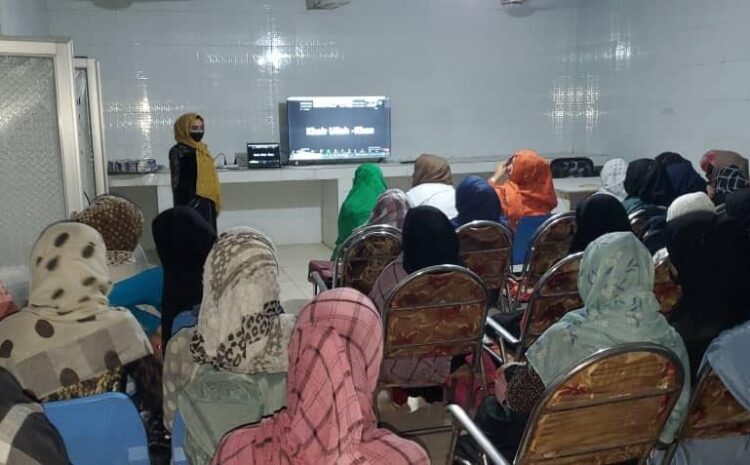
AFGHAN CONNECT Online Medical Classes Project
AFGHAN CONNECT Online Medical Classes Project in collaboration under EDUCAST – ISDB project is currently operating in six provinces in Afghanistan, with plans to expand to 20 provinces. The project is designed to provide critical medical education to Afghan doctors through virtual classrooms, delivering live training every 15 days. The initiative is supported by a range of key partners and funders, which strengthens its impact and sustainability.
Project Overview:
This initiative aims to improve healthcare delivery in Afghanistan by providing medical professionals with continuous education and training. It focuses on reaching doctors in underserved areas who face significant barriers to accessing specialized training. The project provides these doctors with the tools and knowledge needed to address local healthcare challenges through live, interactive online classes.
Key Partners and Supporters:
- Islamic Development Bank (IsDB):
- Role: The primary financial backer of the project, IsDB has provided significant funding to establish classrooms and deliver high-quality online medical education across Afghanistan.
- Afghanistan Humanitarian Trust Fund:
- Role: This fund plays a critical role in supporting humanitarian projects in Afghanistan, including this medical education initiative. The fund’s support helps ensure that the project reaches the most vulnerable populations in the country.
- King Salman Humanitarian Aid and Relief Center (KSRelief):
- Role: As part of Saudi Arabia’s commitment to global humanitarian efforts, KSRelief provides additional funding and resources to enhance the delivery of medical education. Their support ensures the sustainability and expansion of the project.
- Organization of Islamic Cooperation (OIC):
- Role: The OIC has lent its support to the project by advocating for regional collaboration and coordination. Through its network, the OIC helps facilitate partnerships and funding opportunities that bolster the initiative’s reach.
- Ministry of Higher Education of the Islamic Emirates of Afghanistan:
- Role: The Ministry of Higher Education plays a crucial role in facilitating the project on the ground by providing regulatory support and enabling Afghan doctors to participate in the training sessions. The ministry ensures the alignment of the curriculum with national healthcare priorities.
- Park Group:
- Role: Park Group, a strategic partner, provides operational and logistical support, especially for the Afghan Virtual Trade Corridor. Their involvement also helps integrate the economic dimension of healthcare improvement by promoting sustainable models of service delivery.
How It Works:
- Classrooms and Technology:
- The project has established classrooms in six provinces, funded by IsDB. These classrooms are equipped with video conferencing technology to enable Afghan doctors to attend live sessions delivered by international specialists. Expansion to 14 more provinces is planned to cover broader geographic areas.
- Live Medical Classes:
- Frequency: Live classes are held every 15 days, focusing on key healthcare challenges in Afghanistan, including maternal health, infectious diseases, emergency care, and surgery.
- Interactive Learning: The classes allow for real-time interaction between Afghan doctors and international experts. Doctors can ask questions, participate in discussions, and engage with case studies relevant to their medical practice.
- Specialization Focus:
- The curriculum is tailored to address Afghanistan’s healthcare needs, such as trauma management in conflict zones, emergency healthcare, and infectious disease control. Training modules focus on both theoretical knowledge and practical skills.
- Local Participation:
- Doctor Engagement: Afghan doctors from local hospitals and clinics participate in these sessions. Special efforts are made to include female healthcare professionals, empowering them to improve care in their communities.
- Workshops and Simulation: The program includes practical workshops, where doctors apply the skills learned during the sessions through virtual simulations.
- Technology and Tools:
- High-Speed Connectivity: Classrooms are equipped with the necessary tools to ensure smooth delivery of live classes. This includes high-speed internet for live streaming, video conferencing software, and mobile apps for doctors to access training materials remotely.
- AI-Driven Learning: The project uses data analytics and AI tools to provide personalized learning experiences for doctors. It tracks performance, monitors engagement, and suggests additional training based on their needs.
Key Outcomes and Impact:
- Improved Healthcare Delivery:
- Doctors participating in the program report improved knowledge, confidence, and capability in handling complex medical cases. The training has already contributed to better healthcare outcomes in the six provinces where the program operates.
- Empowering Women in Healthcare:
- Special focus is placed on training female healthcare professionals, creating an inclusive environment that enables them to take on leadership roles in local healthcare systems.
- Expansion to 20 Provinces:
- The project’s success has led to plans to expand to 14 additional provinces, ensuring that more Afghan doctors benefit from the training and improving healthcare access across the country.
- Knowledge Transfer and Sustainability:
- The program creates a direct connection between Afghan doctors and international specialists, enabling ongoing knowledge transfer. This helps ensure the long-term sustainability of improved healthcare practices in Afghanistan.
- Economic and Humanitarian Impact:
- The involvement of the Afghanistan Humanitarian Trust Fund, KSRelief, and the OIC adds significant weight to the humanitarian and economic dimensions of the project. The long-term goal is not only to improve healthcare but also to contribute to Afghanistan’s broader socio-economic recovery.
Conclusion:
The AFGHAN CONNECT’s partnership with EDUCAST – ISDB Online Medical Classes Project is a vital initiative that combines international expertise, local engagement, and cutting-edge technology to improve healthcare delivery in Afghanistan. With support from key partners like the Afghanistan Humanitarian Trust Fund, KSRelief, OIC, and the Ministry of Higher Education of the Islamic Emirates of Afghanistan, the project is making a significant impact on the Afghan healthcare system. Its expansion into 20 provinces will further strengthen the country’s medical capacity, leading to better health outcomes and a more robust healthcare system.


